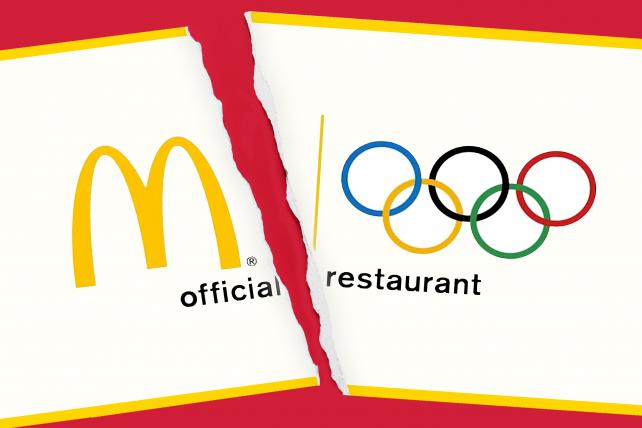McDonald’s and the International Olympic Committee are no longer lovin’ it. The two are ending their longtime partnership.
The breakup is a huge shift for McDonald’s, which has been sponsoring the U.S. Olympic Committee since 1976 and been a TOP partner with the IOC since 1996. Both of those relationships end effective immediately. Financial terms of the separation were not disclosed.
The chain’s decision marks the latest big-name sponsor’s departure from the Olympics, following Budweiser, Citi, Hilton, TD Ameritrade and AT&T.
While McDonald’s and the IOC said they “mutually agreed” to bring the so-called Worldwide TOP Partnership to an end, McDonald’s changing marketing strategies and business goals appear to have sparked the decision.
“In today’s rapidly evolving business landscape, we understand that McDonald’s is looking to focus on different business priorities,” Timo Lumme, managing director of IOC Television and Marketing Services, said in a statement. “For these reasons, we have mutually agreed with McDonald’s to part ways. I would like to thank our friends at McDonald’s on behalf of the IOC for the commitment the company has shown to the Olympic Movement over many decades.”
McDonald’s has been serving food to athletes, the media, and others at the Olympics since 1996, and has done a variety of promotions. Most recently, McDonald’s sent 100 kids from various countries to Brazil to participate in the Rio 2016 Olympics Opening Ceremony.
“As part of our global growth plan, we are reconsidering all aspects of our business and have made this decision in cooperation with the IOC to focus on different priorities,” McDonald’s Global Chief Marketing Officer Silvia Lagnado said in a statement.
McDonald’s connection to the Olympics began when it airlifted hamburgers to U.S. athletes at the 1968 Winter Games in Grenoble, France, who were apparently craving the tastes of home.
McDonald’s plans to operate Olympic Park and Olympic Village restaurants one last time, at the upcoming 2018 PyeongChang Winter Games. McDonald’s remains a sponsor of the 2018 Winter Games, with rights to do marketing in Korea only.
The IOC has yet not named a replacement sponsor in retail food operations and said it has no immediate plans to do so. The IOC said it plans to review the category “in the broader context” of existing Olympic marketing programs.
McDonald’s is the latest sponsor to walk away from the Olympics. Earlier this year, Anheuser-Busch InBev‘s Budweiser ended its sponsorship of the U.S. Olympic Team after a 32-year run. Citi, Hilton, TD Ameritrade and AT&T have also exited their Olympics sponsorships in recent months.
Some have speculated that U.S.-focused advertisers, in particular, may have less interest in the next few Olympic Games given the time differences with PyeongChang, the Tokyo 2020 Summer Games and the Beijing 2022 Winter Games. McDonald’s generates roughly one-third of its revenue in the U.S. But it also operates in more than 100 other countries, including all three of those hosting the next three Games.
The IOC, in its joint statement with McDonald’s, noted that it continues to have sponsors with long-term agreements: Bridgestone, Panasonic, and Toyota have signed through to 2024, Alibaba through to 2028, and Omega through to 2032.
Back in 2012, McDonald’s had extended its Olympics sponsorship through 2020. Since then, McDonald’s has appointed a new CEO, Steve Easterbook, who was appointed in 2015. Under his tenure, McDonald’s aims to do a better job of connecting with diners, including with updated technology such as apps, mobile ordering, and kiosks, and has been modifying its menu, from offering breakfast all day to simplifying ingredients in items such as Chicken McNuggets and soft-serve ice cream. At the same time, McDonald’s is trying to cut costs by $500 million by the end of 2018 and plans to trim costs even further the following year.
McDonald’s top marketers joined well after the Olympics partnership was signed. Lagnado, the global CMO, joined McDonald’s in 2015. And this spring, McDonald’s U.S. CMO Deborah Wahl was replaced by PepsiCo’s Morgan Flatley.
By Jessica Wohl

